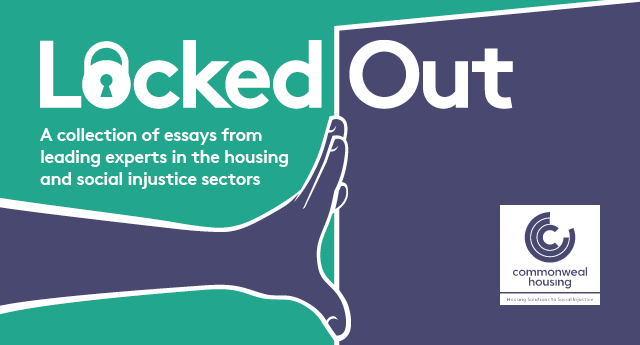Where next? The future of housing for people facing social injustice
 Ashley Horsey, CEO, Commonweal Housing
Ashley Horsey, CEO, Commonweal Housing
The housing crisis: not enough homes; not enough homes where people wish to live; not enough of the right homes meeting the size and types of requirement our society has; not enough homes that people can genuinely afford to pay for on normal wages without relying upon state benefits; not enough safe, secure and well maintained homes; not enough homes providing the support and additional hand-holding many of us need at key points in our lives. These are all the bare facts of a housing crisis.
But what is too often overlooked is the impact that ‘not enough’ is having on those that are already marginalised in our society; those that are tackling a range of other seemingly intractable problems, problems that are exacerbated by inadequate homes or sometimes no housing at all. Housing can be part of the solution to tackling social injustice – just as, sadly, a lack of it or the wrong housing can be the accelerant to a downward spiral of personal and societal injustice. There is no doubt that we need urgent investment in genuinely affordable and social housing to tackle the shortage in the UK.
"Housing can be part of the solution to tackling social injustice – just as, sadly, a lack of it or the wrong housing can be the accelerant to a downward spiral of personal and societal injustice."
Every one of these essays has highlighted how a depletion of housing in recent years has impacted their clients. At Commonweal we support calls across the housing sector to build social housing – with the National Housing Federation recommending 145,000 new social homes every year.
But what emerges from this anthology is not just the need for a roof over everyone’s head – vital though this is. Over and over contributors have stressed the need for safe, secure, and appropriate housing. What this means in practice is more than just bricks and mortar.
When Commonweal invited authors to contribute to this anthology, we asked them a crucial question: if 90% of the people you work with (already some of the most disadvantaged and marginalised) were housed, which groups would be left behind and why? We asked this because we know from experience that people at the sharpest end of social injustice are usually the ones who fall through the cracks. Too often housing isn’t tailored to meet their needs. They may need certain levels or certain types of support to be able to sustain a tenancy. They may need a particular type of property – perhaps one that’s shared, or self-contained, or that has a spare room for a dependent or a carer.
For more than a decade, Commonweal has been working to find housing solutions to social injustice; using our charitable resources to help expert partners try and test new ideas and new models. What we have learnt from this work is that with the right kind of housing at the right point in their personal journey, even the most ‘hard to reach’ groups can be supported towards stable and secure lives.
These essays show us how specialist voluntary organisations hold decades of expertise in the needs and experiences of their clients – expertise which is invaluable to those providing housing to these groups. But charities like these have faced significant cuts in the last decade, with many struggling to stay afloat and keep up with a growth in need as a result of increasingly depleted public services. This has been exacerbated since the Coronavirus crisis, with a recent NCVO survey finding almost half of organisations (43%) surveyed reported an increase in demand for their services but a 48% decline in voluntary income.
To ensure the needs of people facing social injustice are met, we need these organisations to survive the impact of the crisis, and meet the level of need it will create. In the longer term, we need to see a deepening of the positive partnerships between housing providers, local authorities, and the voluntary sector, so that people facing social injustice can get the specialist support they need to sustain a tenancy and eventually move on to stability.
As we head into the unchartered waters of a world that is adapting to the impact of the pandemic, there has never been a more important time to get this right. There has been a welcome movement as a result of the pandemic towards large-scale solutions, rather than tinkering at the edges as has too often been the case. But as we work towards a world in which no one goes without a home, we need a number of different options to help people get there – and crucially, to stay there for good. We need a housing supply that is adaptable to the needs of the people it serves – rather than a ‘one size fits all’ solution.
We need an open conversation about the nuanced responses needed to meet the myriad of different needs of individuals and society and a realisation that there is no silver bullet, no single solution. And whilst
some solutions are absolutely known already and need to be shouted about and replicated, others are yet to be found. It is helping to find those yet-untested solutions that remains Commonweal’s focus.
As these essays have shown, there is sadly much still to be done. As we head into the unchartered waters of a post-coronavirus world, it is the role of national and local decision-makers, experts, housing organisations, and the social injustice sector to work together to put a roof over everyone’s head – and meet the needs of everyone under that roof.

